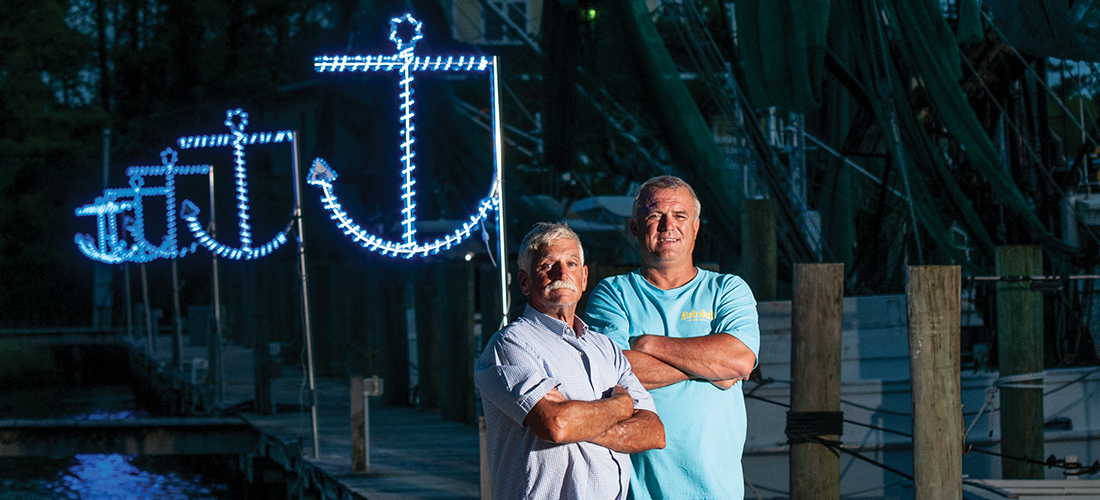Hope Lives
A unique partnership between two Cape Fear area churches and New Hanover Regional Medical Center provides safe places for the homeless to rest and recuperate after hospitalization
By Dana Sachs
Meg McBride: Operations Director, Hope Recuperative Care
You’ve recently converted two residential houses in Wilmington into a new facility called Hope Recuperative Care. Who are your guests?
We provide temporary housing to people who have no place to go when they leave the hospital. In order to stay here, you have to be experiencing homelessness to some degree, either living on the streets, in a car, maybe in an emergency shelter, or in a place that’s unfit for human habitation. And you’ve had a health crisis. You’re medically ready to leave the hospital, but you are not ready to return to life as you were living it.
So, your guests aren’t yet strong enough to go out on their own?
Yeah. Think of this as a gigantic bed and breakfast. We’re totally non-clinical. We don’t do any wound care, or toileting or bathing. When you come here, you have to be able to do those simple things. If people need some type of medical assistance, we work with New Hanover Regional Medical Center to arrange additional care.
Did anything like this exist in Wilmington before you opened in January?
For three years, the hospital worked with a program that operated out of a motel on Carolina Beach Road. They kept two rooms on rent all the time, but there wasn’t 24/7 case management and oversight. The model needed improvements, so after that project closed we wanted to build on that.
How did you get involved in the efforts to open this new facility?
I work under a grant at NHRMC as a disability advocate specifically to help homeless people. About 50 percent of homeless people are also disabled, so we help them access benefits. When the earlier program stopped, the hospital and some nonprofits started meeting: “How are we going to get recuperative care up and running?” That was the question.
And what was the answer?
The answer was an unlikely friendship, a relationship between two sacred organizations — the Anchor Methodist Church and Winter Park Baptist Church — working with a secular organization — New Hanover Regional Medical Center — in a collaborative partnership. I’m a person who feels called to ministry, and this place where organizations with very different missions work together is incredibly exciting.
What brings you to this work, personally?
My first husband was a hemophiliac, and before 1980 the blood supply was not safe. He and I were born in ’69. When our second son was a year old, my husband got pneumonia. We were 24 years old. And then he got shingles and some other weird things. It didn’t make sense. An infectious disease doctor took one look at us and said, “Y’all are getting tested for HIV-AIDS.” I was like, “What??” I didn’t know that hemophiliacs were getting AIDS. He was positive, but the kids and I were negative. There is no explanation for that. It’s a miracle. He was sick for 12 years before he died. In the early ’90s, health care workers were really uncertain about AIDS. I would have to advocate for him. I learned how to demand good care that’s fair and just, and in a way that gets something done. That experience is now being used for good. I don’t take credit for it. I believe that God was preparing something.
Were you religious then?
No. I hated God. I was raised Catholic, so in my mind I was being punished.
You’re a Methodist now?
I am. I’ve landed in the Methodist Church. The Methodists have social principles. Social justice. This isn’t just about caring for people who are homeless and sick. There’s a wider issue. Why is homelessness a problem in the first place? What are we doing to address that as the community of Wilmington? How do we participate through the secular and the sacred?
Can you describe the people you care for here?
A lot of them have diabetes and amputations. Three gentlemen have had throat cancer. One of them died about two weeks ago. He was private. I suspect that he was living behind a McDonald’s. We hosted him for four months. He was a wonderful person — gentle and incredibly appreciative. We did a memorial service and some of the people from the McDonald’s came. They told the most beautiful stories about him. He would come every day and keep the restaurant orderly. He would unclog the toilet. Oh my gosh, they wept.
Are your guests mostly men?
We’ve definitely had more men. In New Hanover County, there are a greater number of homeless men than women. We’ve had maybe eight women come through. We had a girl who was 22 or 23 with a very complicated digestive problem. She needed surgery. She was staying with her grandfather, who was abusing her. Because of that situation, she would return to the emergency department a lot. We get a lot of funding from NHRMC, and we had promised that we would help keep people out of their emergency department. So, the hospital said, “Can you please take her? Let’s just stabilize her.” So, we brought her here, and she didn’t go to the hospital the entire time. In fact, not a single one of our guests has returned to the hospital within 30 days after discharging to our facility.
What role does religion play at HRC?
What happens here that’s really spiritual —
I won’t even say Christian, but maybe a little — is that every morning at 8:30 we go over to the table and we do about 15 minutes of daily prayer. It’s very social-justice oriented. Whoever wants to come comes. And the other thing that we do that’s Christian is we pray before dinner. We’re always starving, so it’s short and sweet.
How might the potential sale of the hospital affect your program?
The nonprofits have been promised that their relationships will be valued. Honestly, there are so many “what-ifs” that I’m not even worried about it. Since we opened, we have saved the hospital the expense of covering over 1,000 bed days in charity care. It’s super-impressive.
How has this project turned out differently from what you expected?
We had all these expenses that exceeded expectations, like transportation, medication, utilities and food. This was our first year, so we are now working toward increasing our budget and finding new sources of financial support. But, in general, everything we planned for — like, we planned for the worst things that we could imagine — didn’t happen. And all the things that we didn’t expect, which are beautiful, have happened.
Like what?
All the small miracles that happen every day.
Dana Sachs’ latest novel, The Secret of the Nightingale Palace, is available at bookstores, online and throughout Wilmington.


